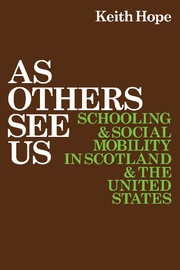Book contents
- Frontmatter
- Contents
- Acknowledgments
- Introduction
- 1 Scotland: A meritelective system?
- 2 Comparison of Scotland with England and Wales
- 3 Comparison of Scotland with the United States
- 4 IQ + effort = merit
- 5 The institutions of managed meritelection
- 6 Was selection carried out fairly?
- 7 Meanings of key terms
- 8 Does deprivation affect life chances?
- 9 Market situation
- 10 Intelligence and occupational mobility
- 11 Intelligence and vertical mobility
- 12 Scottish society
- 13 Understanding other people's norms
- 14 Merit or desert?
- Notes
- References
- Index
13 - Understanding other people's norms
Published online by Cambridge University Press: 05 February 2012
- Frontmatter
- Contents
- Acknowledgments
- Introduction
- 1 Scotland: A meritelective system?
- 2 Comparison of Scotland with England and Wales
- 3 Comparison of Scotland with the United States
- 4 IQ + effort = merit
- 5 The institutions of managed meritelection
- 6 Was selection carried out fairly?
- 7 Meanings of key terms
- 8 Does deprivation affect life chances?
- 9 Market situation
- 10 Intelligence and occupational mobility
- 11 Intelligence and vertical mobility
- 12 Scottish society
- 13 Understanding other people's norms
- 14 Merit or desert?
- Notes
- References
- Index
Summary
In a justly esteemed paper bearing the title “Sponsored and contest mobility and the school system,” Professor Ralph Turner drew a contrast between the norms of the American and the British systems of education, as these existed in the post-World War II period. The paper is lucid, informative, and in many ways correct. But there are certain aspects of it, especially of its choice of terms, that show how difficult it is even for the most accomplished, knowledgeable, and sympathetic observer accurately to characterize the norms of another culture without at the same time denigrating it in the eyes of members of his own culture.
Competition versus contest
Turner identifies the British and American norms of how upward mobility ought to occur as, respectively, mobility by sponsorship and mobility through contest. The distinction is valuable and suggestive, but one of its terms gives a very misleading idea of the nature of the meritelective norm in British society. The term “sponsored” is not well chosen. The idea behind it is that the person to be admitted to the elite is sponsored as he would be if he wished to enter an exclusive club.
- Type
- Chapter
- Information
- As Others See UsSchooling and Social Mobility in Scotland and the United States, pp. 241 - 249Publisher: Cambridge University PressPrint publication year: 1985



